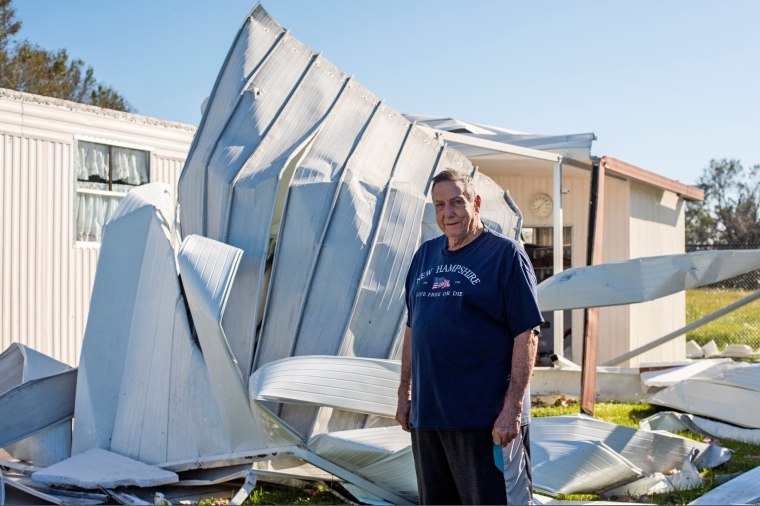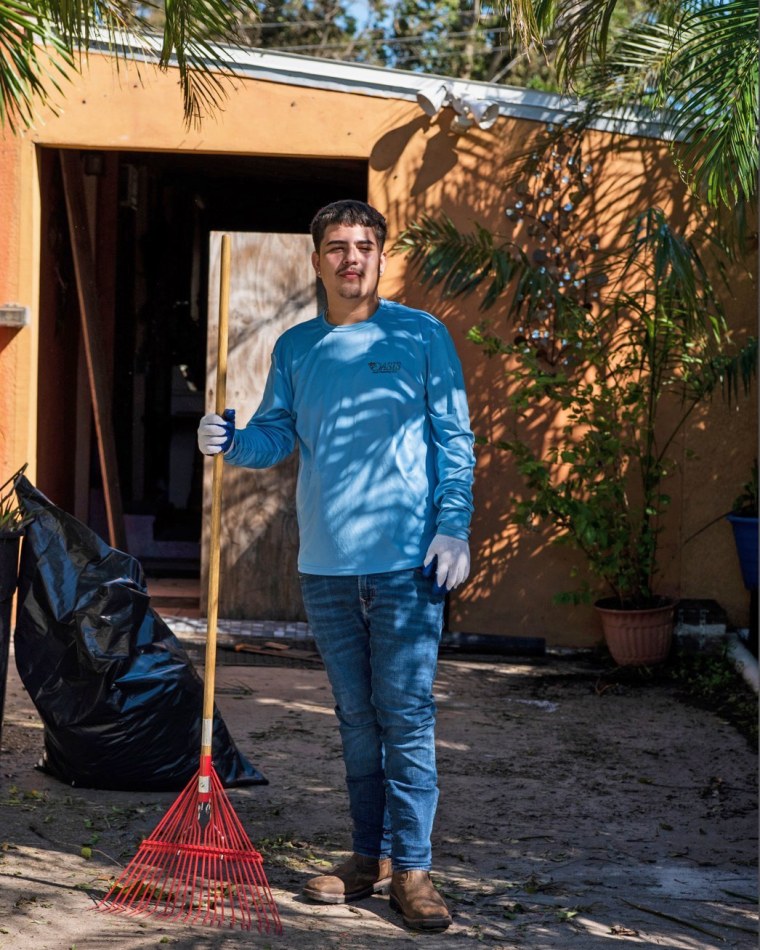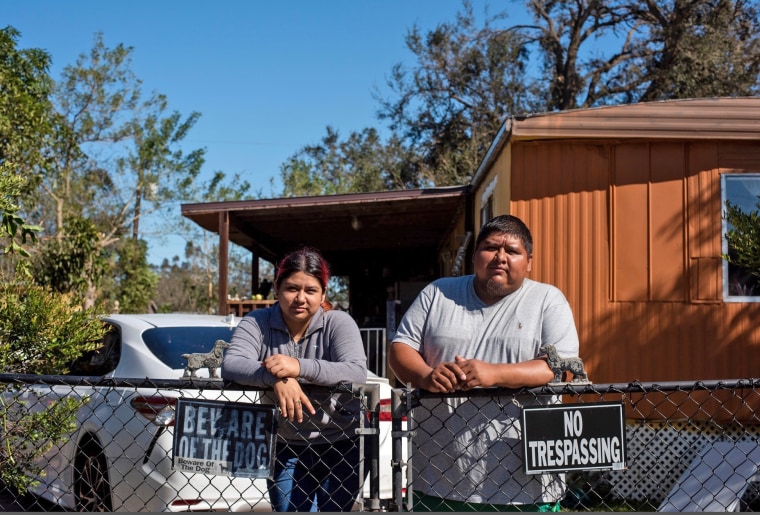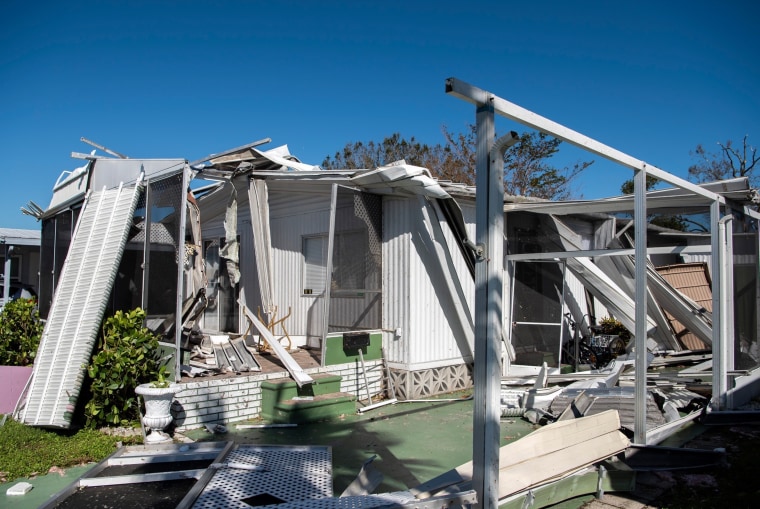PORTABLE HOMES....
- Get link
- X
- Other Apps
01
Hurricane Ian wrecked a mobile home park, but spared another across the street
The front porch was gone. So was the outdoor furniture. And so was the roof.
It was now twisted like a big metal pretzel and resting on the driveway.
Newhall said it was only a matter of time before the local drug addicts carry it off and sell it for whatever they can get.
"It's all scrap metal," he said, chuckling a bit. "The junkies are going to have a field day."
 Fred Newhall outside his damaged home.Tina Russell for NBC News
Fred Newhall outside his damaged home.Tina Russell for NBC NewsSurveying the wreckage, Newhall tried to put on a brave face.
“I don’t take all of this too seriously,” he said.
Nearby, 67-year-old Nancy Mattes was trying to help out her neighbors. Her trailer wasn't damaged so she was pitching in and helping clear debris from the pathways between the rows of wrecked homes.
As Mattes worked, a 70-year-old woman who identified herself only as Mona studied the side of her trailer. It had been pried open by Ian and she could see some of what she owns inside.
"Now it's time for cleanup," she said.
Meanwhile, residents over at the Lazy J Mobile Home & RV Park were counting their blessings.
“We lucked out, actually,” said 18-year-old Malik Castillo as he inspected his trailer. “I thought it would be much worse, to be honest. We were blessed.”
Other than a few knocked-over plants, Castillo said they suffered no other damage.
 Malik Castillo's trailer near the Lazy J Mobile Home & RV Park suffered little damage.Tina Russell for NBC News
Malik Castillo's trailer near the Lazy J Mobile Home & RV Park suffered little damage.Tina Russell for NBC News“I thought there was going to be flooding on the porch because when it rains hard it usually floods in there,” he said. “It’s unfortunate for other people, too, because they lost their homes.”
Don Hill, 67, said he, too, was surprised to find his trailer still in one piece. He said they’re not built to survive the kind of punishment that Hurricane Ian dished out on the other side of Ortiz Avenue.
“I feel sorry for everyone and hope they recover. You just have to have hope, keep praying and hope for the best,” he said.
One block over, in an area where mobile homes sit cheek by jowl with modest bungalows, 28-year-old Martin Herrera was marveling that his trailer had survived unscathed.
"I feel happy and fortunate that our house is still standing," Herrera said.
 Citlali, 15, and Martin Herrera. Unlike some other nearby residences, their home was undamaged.Tina Russell for NBC News
Citlali, 15, and Martin Herrera. Unlike some other nearby residences, their home was undamaged.Tina Russell for NBC News A damaged home in the Poinsettia Mobile Home Park.Tina Russell for NBC News
A damaged home in the Poinsettia Mobile Home Park.Tina Russell for NBC NewsBut as he looked around, Herrera said his joy was tempered by the massive destruction all around his neighborhood.
“We’re not happy because at the end of the day, yeah, our home is still here," he said. "But other people lost everything."
Deon J. Hampton reported from Fort Myers and Corky Siemaszko from New York City.
Deon J. Hampton is a national reporter for NBC News.
Corky Siemaszko is a senior writer for NBC News Digital.
Pump it up: Pilot project in Maine mobile homes points to heat pumps’ potential


Kathy Heseltine’s mobile home is now equipped with a heat pump system through an Efficiency Maine pilot program that replaced the furnace. Ben McCanna/Staff Photographer
Heat pumps are useful for keeping warm in Maine. But they can’t replace a home’s central heating system on the coldest winter days, especially in an old house.
That was what Kathy Heseltine understood to be true, so she was skeptical when a consultant working for Efficiency Maine came last year to her Freeport mobile home park with an offer. The agency would take out her kerosene-fired furnace and install a whole-house heat pump, free of charge. If she wasn’t happy after a year, the consultant said, he’d hook up the old furnace again.
Today, Heseltine is a heat pump evangelist. The 37-year-old mobile home she lives in with her husband, Sam, is more comfortable in the winter, cooler in the summer, and less expensive to heat. She even convinced a sister to get one.
“This has been a real revelation,” Heseltine said. “We really believe in this product, and I was a hard sell in the beginning.”
The Heseltines are part of a demonstration project that swapped central heating systems last year with heat pumps in 10 mobile homes. The aim was to show that today’s high-efficiency heat pumps can do the job alone in subzero temperatures – and counter a perception that they aren’t suitable as stand-alone heating systems.
The project is the first in the country to study the impact of retrofitting mobile homes entirely with heat pumps, according to Efficiency Maine.
In a separate study, consultants also replaced existing systems in nine stick-built homes, ranging from a century-old condo on Great Diamond Island to a newer single-family home in Sanford.
Taken together, the results are meant to help validate the performance of high-efficiency heat pumps. They’re an essential element of Maine’s Climate Action Plan, which seeks to get 100,000 new heat pumps in homes and businesses between 2020 and 2025, with an additional 115,000 whole-house systems by 2030.
More than 27,000 new heat pumps were installed last year, encouraged by Efficiency Maine rebates that range from up to $1,200 for residents overall to $2,400 for those with low incomes. In a state where six out of 10 homes still heat primarily with oil, the overall goal is to phase out heat systems that use climate-warming fossil fuels, in favor of those that run on renewably generated electricity.


Kathy Heseltine stands near a heat pump, right, that was installed in her home through an Efficiency Maine pilot program. Ben McCanna/Staff Photographer
Mobile homes are an apt testing ground. Maine has more than 62,000 units of manufactured housing, according to U.S. Census data. That represents more than 8 percent of Maine’s housing stock. The dwellings are critical to providing affordable housing in rural communities, and it’s no surprise that heating costs are often top of mind for the people who live in them. That’s true of Heseltine, who is retired.
Heseltine said she can’t tally the savings in energy costs until year’s end, because she pays the same amount for electricity each month on a payment plan. But Efficiency Maine has calculated that mobile home residents should save an average of $1,300 a year, compared to using oil or propane at current prices.
Those savings are based on the frugal way that heat pumps use electricity to transfer warmth present in outside air to indoor space, even during winter, using technology similar to that of a refrigerator.
Based on costs per unit of heat, the Maine Governor’s Energy Office calculates that air-source heat pumps using electricity at 21 cents per kilowatt-hour are less expensive than oil at $4.44 a gallon, kerosene at $5.09 a gallon or propane at $3.29 a gallon.
“There are lots of homes in our state that would be terrific candidates for this solution,” said Michael Stoddard, the executive director of Efficiency Maine. “And people could save a lot of money.”
Central heating systems in mobile homes often consist of small, forced-air furnaces that fit in cabinets or closets. Sometimes called Miller furnaces after a prominent brand, they burn oil or propane and distribute heat through ductwork.
Swapping out the furnaces wasn’t a straight-forward exercise in the pilot project, Stoddard said, because there weren’t any distributors in Maine with a heat pump unit that fit easily into the furnace closets. That increased the total cost of both studies to roughly $14,000 per unit, or $266,000, paid from Efficiency Maine funds. Stoddard said he expects the cost to drop, as more manufacturers offer units designed for mobile home retrofits.
‘TOASTY WARM’
The pilot project got underway last year when David Korn, vice president at Massachusetts energy-management consulting firm Ridgeline Energy Analytics, made a presentation at the mobile home park.
Wardtown Mobile Home Cooperative is a resident-owned community on the rural outskirts of Freeport. The community’s 60 lots feature a mix of older and newer manufactured homes, and the majority have furnaces that burn kerosene or propane. An estimated half of the owners are on fixed incomes.
Marianna Casagranda was at that meeting. As she remembers it, a few people who attended promptly walked out after Korn told them their existing furnaces would be removed for the project. But Casagranda, the Heseltines and eight other owners were intrigued by the offer.
Casagranda lives in a 910-square foot single-wide mobile home. It’s only two years old, had a propane furnace and is better-insulated than most older units. But Casagranda said she saw the opportunity to switch to a cleaner heating system that was less expensive to run.
“I thought, ‘Let’s just see what it feels like for a whole year,’ ” she said. “And I have to say, I’m very impressed.”
There were several nights last winter when the outside temperature hovered near zero, Casagranda said, but her home stayed at a comfortable 68 degrees. And she enjoyed the heat pump’s air conditioning function during last summer’s heat wave.
She’s also happy with her energy bills. In January 2021, her propane bill was $189 and electricity cost $33, for a total of $222. Last winter, her electric bill that included the heat pump was $142.
“I have been a happy customer,” she said. “I have no interest in going back to propane.”
The Heseltines’ 1,000-square-foot home isn’t as well-insulated and also has a stick-built addition. Kathy Heseltine said the couple was skeptical coming into Korn’s presentation, because they had heard “so much negative publicity” about heat pump performance.


Last winter changed her mind. The house was “toasty warm,” she said. And being comfortable in the summer has been a bonus.
“We never had air conditioning and last summer was a doozy,” she said. “In 15-20 minutes, you’re as chilly as you can be.”
These assessments line up with data being compiled by Ridgeline, the consultant. The coldest temperature recorded during the trial, at Portland International Jetport, was 4 degrees below zero in January.
“We believe that some of the local temperatures at (Wardtown) were actually a few degrees colder,” Korn said.
“All of the homes were able to heat to about 70 degrees or to their preferred temperature, even during the coldest temperatures, according to our metering equipment and according to the 10 customers who received heat pumps.”
POPULARITY, BUT PUSH-BACK

Comments
Post a Comment
If you have any doubt, please let me know....